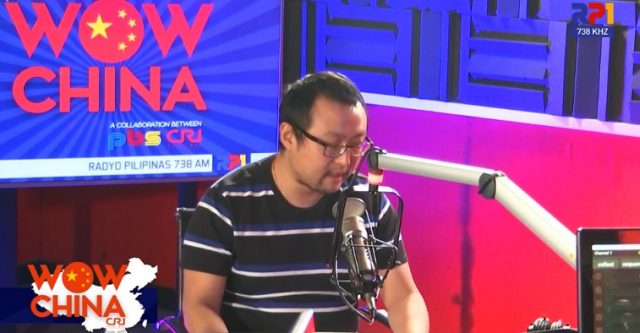A radio program called “Wow China” being aired on the state-run Radyo Pilipinas sparked outrage over the weekend despite the segment being run since 2018.
The radio program is a collaboration between Philippines Broadcasting Service or PBS, a radio network run by the national government, and the China Radio International, its counterpart in China.
Radyo Pilipinas is PBS’ flagship AM radio station, also run by the government.
Based on reports, this broadcast has been on air since mid-2018. However, its episode last Sunday on May 10 suddenly gained traction on social media.
In the latest episode, the hosts Nimfa Asuncion, Sissi Wang and Ernest Wang discussed Mother’s Day celebrations during the novel coronavirus pandemic and the national government’s quarantine measures to help slow down the spread of the COVID-19 transmissions.
Since it was uploaded on Facebook last Sunday, the nearly one-hour video clip earned more than 692,000 views and made rounds on the platform more than 16,045 times. It also has more than 19,000 reactions, wherein 17,000 of these are angry reactions.
The most reacted comments placed under the video on Facebook were also a backlash against the hosts and the government.

Chinese propaganda in the time of COVID-19?
This post eventually reached Twitter on May 11. The segment title “Wow China” briefly made it to the Philippine Trends list of Twitter.
Some Filipinos accused the government of using taxpayer’s money to spread Chinese propaganda.
“Today I learned that Radyo Pilipinas, a government-owned AM radio station, has a program called Wow China, a collaboration between the Philippine Broadcasting Service and China Radio International, which airs pro-China propaganda, paid for by Filipino taxes. Nice, no?” one Twitter user said.
Sen. Risa Hontiveros, who might be unaware that the radio show is more than a year old already, likewise questioned the timing of the airing of “Wow China” while the government is dealing with the health crisis.
“Filipino taxpayers should be indignant that we are essentially paying for a radio show that promotes China’s policies. We have let Chinese propaganda reach our shores. Inaangkin na nga nila ang West Philippine Sea, pati ba naman ang radyo natin sa kanila na rin?” Hontiveros said on social media.
Filipino taxpayers should be indignant that we are essentially paying for a radio show that promotes China’s policies.
We have let Chinese propaganda reach our shores. Inaangkin na nga nila ang West Philippine Sea, pati ba naman ang radyo natin sa kanila na rin?
— risa hontiveros (@risahontiveros) May 12, 2020
A look on ‘Wow China’ and PBS mandate
A cursory search of Interaksyon showed that the radio program “Wow China” was not included in Radyo Pilipinas’ official list of programs on its website.
There were also no similar broadcasts wherein PBS has a partnership with other foreign radio networks.
The program was not specified in the mandate of PBS, which was created under Executive Order No. 297 dated July 25, 1987. The executive order listed down the type of programs or segments allowed in the radio network’s stations.
Based on this executive order, the PBS’ mandate is “to provide broadcast information on the activities, policies, and directions of the government and the Presidency, through the use of broadcast media throughout the country.”
In terms of running programs, one of its “mission statements” is to “provide broadcast programming designed to preserve and promote the national heritage and culture, advance educational goals, and support the thrust and goals of the presidency and the government.”
In 2018, the Presidential Communications Operations Office’s plan to air Filipino-dubbed Chinese shows in state-run People’s Television also earned some criticisms online.
However, PTV that time is already airing Korean and Japanese content dubbed in Filipino.
READ: Does PTV-4’s decision to air Chinese shows violate its own mandate?
Last April, the Chinese Embassy in the Philippines’ tribute music video to for the health workers and frontliners called “Iisang Dagat” was also heavily criticized online for its pro-China stance.
The embassy and the song used was perceived to be spreading for allegedly spreading propaganda over the West Philippine Sea row.










